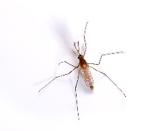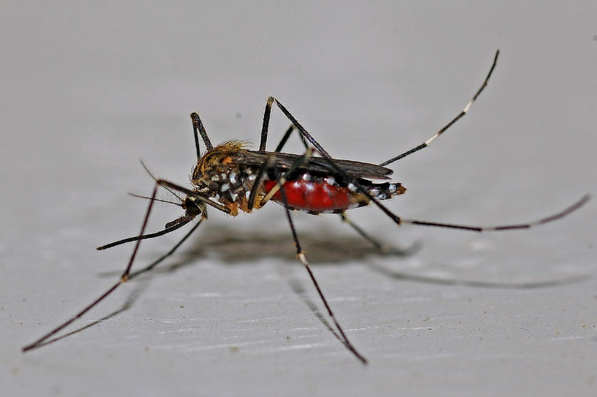
Mosquitoes are notorious blood-sucking pests that are most closely associated with itchy bumps from their bites. You’ve likely experienced these bites when trying to enjoy time outdoors with your family and friends. Every summer, mosquitoes descend on our area, causing us to run indoors when we want to spend time in our yards.
Mosquitoes use stagnant water that’s around your property to breed their young. Storm drains, flower pots, and birdbaths can all collect excess water. Their disturbance isn’t a problem unique to Californians. Mosquitoes breed across the country, ruining picnics and bonfires for thousands of people every year.
Should I Be Worried About Mosquitoes?
Yes, mosquitoes have the potential to spread the following diseases (less likely in the U.S.):
- St. Louis Encephalitis (SLE) – First identified in St. Louis in 1933. Only a small portion of those infected by SLE exhibit symptoms and become ill. Severe cases progress from meningitis and encephalitis to coma and possible death.
- West Nile Virus – The first confirmed case of West Nile Virus in California was in 2002. 80% of people do not feel any symptoms. Severe and rare cases cause brain inflammation or meningitis, and sometimes death.
- Zika Virus – The first confirmed case of Zika virus was around 2015. Common symptoms last several days to a week, including fever, rash, headache, conjunctivitis, muscle pain, and joint pain. Although the Zika virus is active in California, cases are sporadic and uncommon.
- EEE virus (Eastern Equine Encephalitis) – Another illness that is transmitted to humans by mosquitoes. In California, there are no reported cases. However, many other parts of the United States have suffered from this deadly virus.
And you should know it is the female mosquitoes that are deadlier than the male ones. Female mosquitoes need protein for their eggs, and only a blood meal can help them to produce that protein. When females are not laying eggs, they are also happy on a flower diet! Male mosquitoes feed mostly on the nectar of the flowers.
Animal hosts such as dogs, horses, chickens, and humans contract viruses from infected mosquitoes, but do not spread the virus. This is why they are considered “dead-end hosts.”
But one of the many mosquitoes you need to look out for is the Aedes mosquito. They’re invasive and also carry deadly diseases in California.
What is the Aedes Mosquito?
Also known as the ‘Yellow Fever Mosquito’, The Aedes mosquito is a species invasive to California. Aedes mosquitoes are small and black with white stripes, and are more aggressive than other species. But unlike other mosquito species, they bite people and animals during the day.
First emerging in southern California in 2011, the Aedes originally arrived in the area from international shipments of goods. The range of diseases the Aedes mosquito has been expanding, which includes:
- Yellow fever
- Mayaro
- Dengue
- Chikungunya
- Zika
To prevent Aedes-borne illnesses, you can boost your immunity with vaccines and avoid them from coming close to you. And as general tips to avoid these mosquitoes, you can use screens to stop them from coming indoors, and wear long sleeve shirts and pants.
Despite their aggressive spread, the Aedes is one of many mosquito types we at AAI Pest Control take care of with reduction efforts.

What Attracts Mosquitoes to My Yard?
Stagnant water is the main culprit in attracting mosquitoes to your yard. Mosquitoes breed in still water, even as small as water gathered in a plastic soda bottle cap. Rainwater can gather around your property within tires, downspouts, bird baths, children’s play equipment, buckets, clogged gutters, and flower pots. However, even if you dump water diligently, a next door neighbor who isn’t as proactive can cause mosquitoes to wander into your yard.
How Can I Prevent Mosquitoes from Getting Into My Yard?
The main thing you can do to prevent drawing mosquitoes to your yard is emptying the standing water around your property. As a homeowner, it’s essential to prevent or at least limit as many encounters with mosquitoes as possible. They’re drawn to this habitat because that’s where they lay their eggs.
This includes filling in low-lying areas, cleaning your gutters, and flipping over wheelbarrows and kiddie pools when not in use. Water can also be collected in places such as bird baths, open buckets or bins, kids’ toys, or empty flower pots. Also, never leave dog bowls outside during the rain.
Sometimes eliminating standing water is not possible. If you live near a body of water such as a lake, stream, or pond, mosquito activity is nearly guaranteed. Without professional mosquito control, breeding can continue throughout the spring, summer, and early fall.
To keep mosquitoes at bay, you can also repair broken screens in windows and doors. This will help keep the pests from getting inside. Mosquitoes don’t breed indoors, but it’s easy for them to accidentally fly in and bite you if given a chance. Another way to protect against mosquitoes is to wear mosquito repellent when outside.
How Can I Keep Mosquitoes Away Naturally?
The following ingredients are listed by the EPA to keep mosquitoes and ticks away naturally:
- Citronella Oil – Repels several biting insects, including mosquitoes, and masks the scents on your body that may attract insects.
- Nepeta Cataria – Also known as Catmint or Catnip Oil. This product is made to repel black flies, mosquitoes, and other biting insects.
- Lemon Eucalyptus Oil – Naturally derived ingredient from eucalyptus plants. Used to repel mosquitoes, biting flies, and gnats.
- DEET – Used to repel mosquitoes and ticks. Creates a scent barrier on your skin that insects find unattractive.
- IR 3535 – Repels mosquitoes, deer ticks, body lice, and biting flies.
It’s important to note that the EPA does not require botanically-based repellents to be registered. This leaves a lot of “natural” or “organic” products on the market with limited data to confirm their “green” claims. However, lemon eucalyptus oil has undergone careful examination for effectiveness and remains approved by the EPA as highly effective and of minimal risk.
What is DEET?
DEET (scientifically referred to as N,N-diethyl-meta-toluamide) is a repellent that was developed by the United States Army in 1946 to protect soldiers in areas where pests transmitted illnesses. In 1957, it became approved for use by the general public. It’s mostly used in products that are applied directly to the skin or on clothing to repel mosquitoes and ticks in the form of lotions, sprays, roll-ons, and bracelets.
DEET repels these pests that approach you by creating an invisible barrier around the areas where the product has been applied, causing you to be undetectable to mosquitoes and ticks. Products that contain DEET display the amount of the ingredient by percentage. It’s important to note that higher percentages do not indicate a higher strength of DEET.
Always keep in mind that DEET does not kill mosquitoes and ticks. Professionals do, though! Mosquito extermination professionals help you kill and prevent mosquitoes with top-notch reduction services.
Don’t Let Mosquitoes Get the Best of You
If you want to prevent mosquitoes from getting into your yard, call AAI Pest Control! We provide effective and professional mosquito control services that prevent mosquitoes from breeding in your yard! Call us or fill out the contact form on this page to get started!



